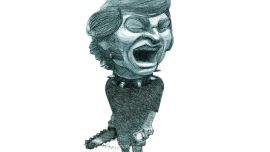With full regalia, military honours and a skywriting squad, President Jair Bolsonaro presided over a lavish gala Tuesday for the embalmed heart of Emperor Pedro I, who declared Brazil's independence from Portugal 200 years ago.
Speaking a day after the gilded urn containing the heart arrived in Brazil on loan from Portugal – where Pedro I died in 1834 – Bolsonaro welcomed the organ with the pomp and circumstance usually reserved for a visiting head of state.
Brazil and Portugal "are two countries united by history and bound by the heart," the far-right president told a crowd outside the presidential palace in Brasília, after air force skywriters traced a heart-shaped cloud in the sky.
"We are marking 200 years of independence, and an eternity of freedom to come. God, nation and family. Long live Portugal, and long live Brazil."
Escorted by the chief of police of Porto, Portugal, where Pedro I died of tuberculosis, the formaldehyde-soaked heart was carried up the ramp leading to the ultra-modernist Planalto palace, guarded by soldiers decked out in period attire.
The gala kicked off two weeks of ceremonies leading up to the bicentennial of Brazilian independence on September 7, a politically charged occasion coming as Bolsonaro battles to win reelection in October.
Cadets from the Dom Pedro military school invited for the occasion greeted Bolsonaro with cheers of "Myth! Myth!" – the nickname supporters have bestowed on the far-right incumbent.
Not all Brazilians are aflutter about the heart, however.
Bolsonaro, who is also planning a big independence day rally and military parades, has faced accusations of fanning the flames of nationalism with the festivities.
Critics said parading the heart around was reminiscent of when Brazil's 1964-1985 military dictatorship – which Bolsonaro openly admires – brought the rest of Pedro I's body back from Portugal, in 1972.
Affairs of the heart
Dom Pedro, a beloved figure in both Brazilian and Portuguese history, has been divided between the two countries in death – his heart enshrined in a church in Porto, Portugal, and the rest of his remains in an independence monument in Säo Paulo, Brazil.
But Porto city officials agreed to return the heart on loan until September 8.
Dom Pedro fled to Brazil with his family as a nine-year-old boy when Napoleon's army invaded Portugal in 1807.
He stayed behind to rule the then-colony as regent when his father, King Joao VI, returned home to the increasingly restless metropole in 1821.
Facing pressure to rein in the political autonomy the colony had enjoyed, Pedro I instead declared it an independent country on September 7, 1822, and became its first emperor.
But no sooner had he thrown off Portuguese rule and established Brazil as a constitutional empire than turbulence across the Atlantic forced him to return to Portugal.
His younger brother had usurped the Portuguese throne and was attempting to return the country from constitutional government to absolute monarchy.
Pedro I, who is known in Portugal as Pedro IV, abdicated in 1831 and sailed back to Portugal, leading an army into Porto in support of the constitutionalists' ultimately successful struggle.
After his death, he was celebrated in both Brazil and Portugal as a champion of liberal causes and representative rule.
At his request, his heart was removed and kept in Porto, in gratitude to its people for their support.
The nine-kilogram (20-pound) urn containing it is normally kept under quintuple lock and key at the Our Lady of Lapa church in Porto.
related news
by AFP / Ramon Sahmkow


























Comments